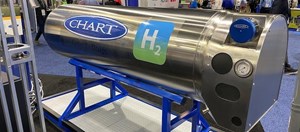News
Hyzon Motors completes liquid H2 FCEV demo
Hyzon Motors, Performance Food Group and Chart announced the completion of Hyzon’s first commercial run with a liquid H2 fuel cell electric vehicle. Starting in Temple, Texas, the truck completed deliveries to eight PFG customers near Dallas, Texas, traveling over 540 miles on a 16-hour continuous run including over 100°F temperatures. The run—further than the distance from Sacramento to San Diego—demonstrates the viability of on-board liquid H2 to fuel long-distance, zero-emission transport.
“With increased range and no added weight in comparison to our gaseous H2 trucks, we believe this liquid H2 demo run has demonstrated potential viability for the future of liquid H2 in commercial trucking,” said Hyzon Chief Executive Officer Parker Meeks. “The results we captured in the strenuous demo through Central Texas’s diverse terrain and summer heat make us optimistic that, once commercialized, our liquid H2 vehicle powered by our proprietary 200-kW fuel cell system should be able to provide long distance range between 650 and 800 miles, on par with many diesel truck range requirements.”
Compared to gaseous H2, the current industry standard, liquid H2 allows Hyzon to increase the amount of fuel on board significantly thanks to increased energy density, with no changes to vehicle weight or payload. To maintain the energy-dense liquid state, H2 requires cold temperatures of negative 400°F. Hyzon partnered with Chart Industries to develop a tank system capable of storing liquid H2 at extremely cold temperatures and delivering it to the fuel cell system at the necessary pressure.
"This is a meaningful accomplishment for the H2 ecosystem, as long-haul and heavy duty transportation is a key end-use for liquid H2,” said Jill Evanko, Chart’s CEO and President. “Our investment in our unique cryogenic liquid H2 onboard tank and our liquid H2 test facility support progress in the H2 industry, with the Hyzon and PFG road demonstration another key step in the evolution of H2 commercialization.”
Liquid H2 as a fuel source has been estimated to be up to $5/kg less expensive all-in to dispense than high-pressure gaseous H2, which would provide meaningful benefits to fleet owners.


